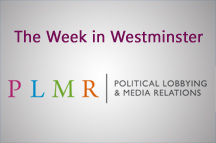 It was manifesto week this week, which started with a clear land grab for any wavering Labour voters who might be considering going blue this time (and there are quite a few, apparently).
It was manifesto week this week, which started with a clear land grab for any wavering Labour voters who might be considering going blue this time (and there are quite a few, apparently).
Writing in the FT on Monday, Mrs May said: "It is the Conservative party that is the voice of ordinary working people once again." And this theme has continued throughout the week, with new announcements on workers’ rights (far from traditional Tory fayre), including time off for those caring for ill relatives. In another departure from home comforts for CCHQ staffers, a trip up the A1 to Halifax was to follow later in the week.
Rather than letting the markets have their way, a new strain of interventionism emerged from Number 10, with caps on energy prices and controls on the gig economy. Critics might argue this is “virtue-signalling”, to use one of the political phrases of the day.
Then on Tuesday we had the long-awaited launch of the Labour document, with the familiar sight of Jeremy Corbyn being cheered to the rafters by rapturous supporters, in a packed Bradford University. Polling has shown that much of its content is popular amongst voters, but one suspects that won’t be reflected at the ballot box. The usual argument about whether or not the numbers add up raged – on some policies Labour didn’t even dare to suggest how it would be paid for, like social care: “We will seek consensus on a cross-party basis about how it should be funded”.
 Wednesday brought rain, and the turn of the Lib Dems. As usual, whenever Tim Farron says something that goes down well, someone brings up his 10-year-old comment on abortion. He just can’t shake it.
Wednesday brought rain, and the turn of the Lib Dems. As usual, whenever Tim Farron says something that goes down well, someone brings up his 10-year-old comment on abortion. He just can’t shake it.
And just like the Tories, the Lib Dems are trying to step on Labour’s toes, with a centre left set of policies designed to tempt away disaffected voters and diminishing Remainers. They’re also doing their best to shake off their tweed elbowed stereotype, with a launch event at the edgy Oval Space nightclub in Hackney, and a suitably ravey lighting show. But the strategy is risky, and it looks unlikely that the party can square the circle by winning their south west rural heartlands, whilst continuing to make gains in suburbia.
Theresa May’s drip drip drip of policy announcements became a torrent on Thursday, as her long awaited (and delayed) manifesto finally rolled off the presses. You will all be familiar with its contents, and the challenges to some of these have been vociferous. The PM had kept an unusually low profile prior to taking office, earning her the name ‘Submarine May’ in the Cameron years, but has found it far from easy out on the campaign trail and when forced to make new announcements as a head of state. Her reluctance to engage in head to head debate with her rivals, or even the general public, is further evidence of this.
But she is a pragmatist, rather than populist. Tackling tough issues like social care is something that successive governments have been nervous about, wary of the backlash from the electorate. Her rhetoric is often about taking the ‘hard decisions’, and a seemingly unassailable lead means that she has the opportunity to do so.
So for now, she continues to tread a tightrope between her braying Brexiteer backbenchers, and a wish to court wantaway Labour voters, as well as establish a strong personal mandate that will be necessary for the complicated Brexit negotiations and domestic challenges ahead. It’s a tricky balancing act, but one she looks set to pull off – Ladbrokes this morning were predicting a 150 seat majority.














